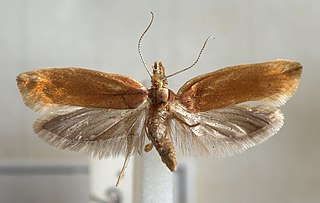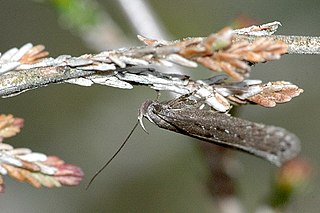
Swammerdamia pyrella is a moth of the family Yponomeutidae. It is found in Europe, North America and Japan.

Notocelia uddmanniana, the bramble shoot moth, is a moth of the family Tortricidae. It is found in Western Europe and the area surrounding the Mediterranean Sea all the way up to the Caucasus, Kazakhstan, Iran and China.

Evergestis extimalis is a species of moth of the family Crambidae. It is found in the Palearctic.

Cataclysta lemnata, the small china-mark, is a moth species of the family Crambidae. It is found in Europe, Morocco and Iran.

Nymphula nitidulata, the beautiful china-mark, is a species of moth of the family Crambidae described by Johann Siegfried Hufnagel in 1767. It is found in Europe, Japan (Hokkaido), Turkey, Armenia, Russia and China.

Udea olivalis is a species of moth of the family Crambidae. It was first described by Michael Denis and Ignaz Schiffermüller in 1775 and is found in Europe.

Coleophora serratella is a moth of the family Coleophoridae. It is found in Europe, Japan (Hokkaido) and North America.

Ypsolopha ustella, the variable ypsolopha moth, is a moth of the family Ypsolophidae. It is found in most of Europe and is also present in North America.

Agonopterix arenella is a species of moth of the family Depressariidae. It is found in all of Europe, except the Iberian Peninsula.

Denisia similella is a moth of the family Oecophoridae. It is found in Europe.

Neofaculta ericetella is a moth of the family Gelechiidae. It is found in Europe and Asia Minor.

Paraswammerdamia lutarea is a moth of the family Yponomeutidae. It is found in Europe.

Parornix anglicella is a moth of the family Gracillariidae. It is widespread in: Europe including Albania, Austria, Belarus, Belgium, Bosnia and Herzegovina, Britain, Bulgaria, Croatia, Corsica, Czech Republic, Danish mainland, Estonia, Finland, French mainland, Germany, Hungary, Ireland, Italian mainland, Latvia, Lithuania, Luxembourg, Montenegro, North Macedonia, Norwegian mainland, Poland, Portuguese mainland, Romania, central and northern Russia, Sardinia, Serbia, Sicily, Slovakia, Slovenia, Sweden, Switzerland, Netherlands, Ukraine. Outside Europe it is recorded from the Near East and Nearctic realm.

Bucculatrix frangutella is a moth of the family Bucculatricidae. It was described by Johann August Ephraim Goeze in 1783. It is found in Europe.

Lyonetia clerkella, the apple leaf miner, is a moth in the family Lyonetiidae. It is found all over Europe, north-western Siberia, the Far East, northern Africa, the Middle East, Turkey, India and Japan.

Eriopsela quadrana is a moth of the family Tortricidae. It is found in most of Europe, east to the eastern part of the Palearctic realm.

Parornix betulae is a moth of the family Gracillariidae. It is known from all of Europe, east to Korea. It was recently reported from Canada, with records from Québec, Ontario and British Columbia.

Parornix scoticella is a moth of the family Gracillariidae. It is known from all of Europe.

Eupithecia trisignaria, the triple-spotted pug, is a moth of the family Geometridae. It is found from across the Palearctic realm from Europe to Siberia.

Swammerdamia caesiella is a moth of the family Yponomeutidae. It is found from most of Europe to Japan. It is also present in North America, where it is possibly an introduced species.




















